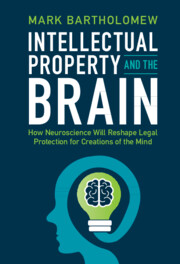 Intellectual Property and the Brain
Intellectual Property and the Brain Published online by Cambridge University Press: 14 July 2022
The Introduction sets out the central premise of the book: a sea change in our understanding of the human brain has deep, unexamined implications for intellectual property law. The Introduction begins to build the case for this argument by providing a brief description of the techniques used to detect the biological mechanisms attendant to different thought processes. It connects these techniques to the relevant actors whose perspectives structure the book’s three main parts: artists, audiences, and judges. Neuroscientific lessons for intellectual property law should be approached with a mixture of hope and caution. The hope comes from replacing some of the mistaken hunches about artists and audiences that have shaped intellectual property law for decades. The caution comes from a need to avoid junk science and neuroscientific theories that could do damage to the underlying aims of copyright, patent, and trademark law.
To save this book to your Kindle, first ensure no-reply@cambridge.org is added to your Approved Personal Document E-mail List under your Personal Document Settings on the Manage Your Content and Devices page of your Amazon account. Then enter the ‘name’ part of your Kindle email address below. Find out more about saving to your Kindle.
Note you can select to save to either the @free.kindle.com or @kindle.com variations. ‘@free.kindle.com’ emails are free but can only be saved to your device when it is connected to wi-fi. ‘@kindle.com’ emails can be delivered even when you are not connected to wi-fi, but note that service fees apply.
Find out more about the Kindle Personal Document Service.
To save content items to your account, please confirm that you agree to abide by our usage policies. If this is the first time you use this feature, you will be asked to authorise Cambridge Core to connect with your account. Find out more about saving content to Dropbox.
To save content items to your account, please confirm that you agree to abide by our usage policies. If this is the first time you use this feature, you will be asked to authorise Cambridge Core to connect with your account. Find out more about saving content to Google Drive.